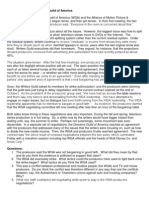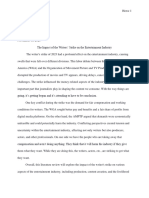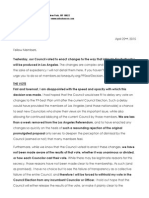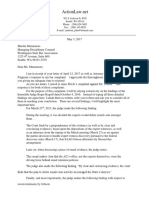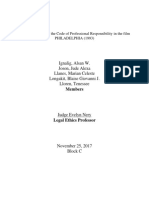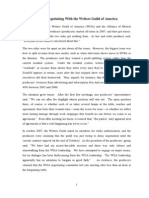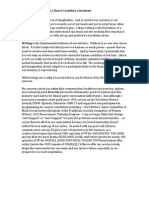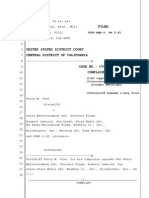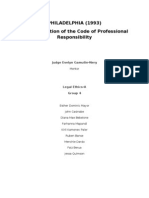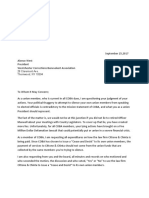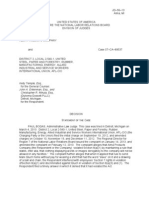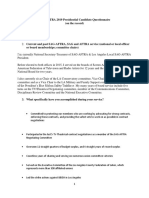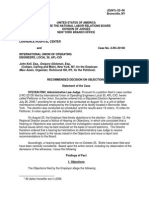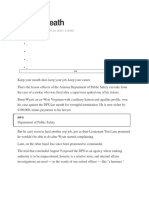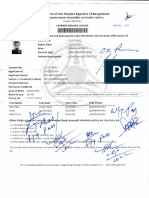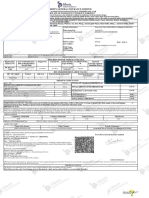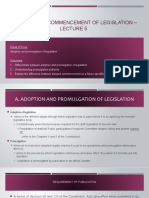WGAws Appeal Letter to Members
Dear Fellow WGAw Members,
Thank you for taking the time to read this letter.
Between July and December 2023, the WGAw’s Chair of the Strike Rules Compliance
Committee investigated my alleged breach of the Strike Rules, found no serious
breaches, and recommended no disciplinary action.
Following a WGAw hearing on May 15, 2024, the Trial Committee appointed by the
Guild also did not advocate for an expulsion in their report to the WGAw Board, instead
recommending a lesser disciplinary action of a suspension.
On June 24, 2024 however, the WGAw Board, in a motion put forth by Adam Conover,
voted to expel me from the WGAw without providing any justification for going against
the findings of its own investigator, and the recommendations of the Chair of the SRCC
and Trial Committee.
In this letter, I will address each of the WGAw’s charges, and provide evidence that:
● the Board disregarded the findings and recommendations of the very governing
systems the Guild has in place to ensure fair treatment of its members;
● the Board turned a blind eye to gross breaches of procedural fairness, including
violations of the WGAw Constitution and federal labor laws during the trial, and
even voted to change the rules to retroactively disadvantage my appeal; and
● the Board’s key motive was to have me ‘tell’ on an individual whom they were
pursuing in a separate matter, to serve their own agenda.
Your consideration of my testimony laid out below not only impacts my future, but the
future of all WGAw members.
It will set a precedent: either the Board is accountable to fairness and the best interests
of all members, or it will be allowed to violate due process, rewrite the rules, break the
rules, and have the power to target any member to serve their own agenda.
Vote for the Alternative Action so the Board can’t extort you for information.
My Background
I moved to Los Angeles with less than $1,000 to my name, wrote my way out of
homelessness, and was living out of my ‘02 VW Jetta when I first became a WGAw
member. I still remember the day I picked up my WGAw card. I have a history of being
�an upstanding guild member— I served on WGAw Awards Juries, the Guild wrote me a
letter of recommendation in 2023, and even at my lowest, I loaned money to friends so
they could afford the WGAw and SAG-AFTRA sign-up fees.
My issue is not with our remarkable community of writers — or the dedicated WGAw
staff and committee volunteers I’ve been honored to serve alongside — but with the
overreach of the WGAw Board.
The Production
In the first weeks of the 2023 strike, I directed a low-budget, independently produced
and financed feature film called “Guns Up” based on a script I wrote. My writing deal on
the film was done prior to the strike, and during the strike, I was not paid for any writing,
nor did I ask for any payment.
Guns Up was a frantic 18-day shoot, and happened just down the road from It Ends
with Us in New Jersey. To address health and safety issues that arose during principal
photography, I made script adjustments in my capacity as a director that were in line
with the DGA advice to hyphenate writer-directors of the time.
Excerpt of email correspondence from the Director’s Guild of America to Membership, “DGA Member Update
Regarding WGA Strike Rules”:
Examples of the script changes, which I disclosed to the SRCC and Trial Committee
and explained were covered by DGA’s (a) through (h) services, include:
● Moving an exterior scene indoors because several crew members had asthma from
the wildfires that blanketed New Jersey with toxic smoke, exceeding IATSE safety
thresholds.
● Rewriting dialogue at the request of an actor who reported the original lines were
triggering due to a past domestic violence trauma.
● Tweaking action sequences to accommodate safer locations.
I was told by the producers, as well as my now former entertainment attorney, DGA
members who served as producers on film, and other Guild members that these
changes I made as a director would not be in breach of the Strike Rules. If I had ignored
the Strike Rules, I would have made 1,001 creative changes. I deliberately held back as
I believed those changes would have gone against the ethos of the strike.
The pages that the Guild later alleged were evidence of ‘scabbing’ were scenes
tweaked and shortened for sides by production and a separate scene that was written
2
�by me prior to the strike, but rewritten by a producer without my permission during
production.
Regarding the rewritten scene, I was handed those pages on set the day we had to
shoot that scene. I never received a digital copy.
Needless to say, I was upset that someone had rewritten the end of my script to cram in
creative notes and also add a product placement. I asked the non-studio producer who
had written these pages and was told it was one of the studio’s producers—someone
that I was already no longer on speaking terms with due to his prior bad behavior on
set.
Pre-Hearing Conversations With the WGA
In July 2023, I received an email from the Chair of the SRCC, Glen Mazzara, saying he
was investigating an alleged breach of the Strike Rules.
I acted in good faith throughout the SRCC investigation, which Mr. Mazzara
acknowledged during the hearing:
Trial Excerpt 1
WGAw Hearing Transcript, 2024, p. 32, lines 10-15:
In December of 2023, Mr. Mazzara called to inform me that he had completed his
investigation, and didn’t anticipate the matter would go any further.
I was therefore surprised to receive a Charge and Notice of Disciplinary Hearing in April,
2024, summoning me to appear before a Trial Committee.
A representative of the Guild then called me to see if we could meet to “hash things out”
prior to the hearing. When we met, I expressed confusion around being called for a
hearing given the investigation concluded with a recommendation of no charges. The
Guild representative said the hearing would just be a “formality.” I asked if the matter
would be confidential and handled privately, and he assured me it would.
3
�He asked for information and I was upfront about the writing that I did on set, explaining
that the changes were necessary to protect cast and crew, and referenced the DGA’s
advice to hyphenate members. He replied: “If you tell the [Trial Committee] what you
told me, you’ll be fine.”
During the pre-trial meeting, I asked the representative if I’d be breaking the law by
sharing the versions of the script I had with the Guild. He said he “didn’t know” but
would get back to me with an answer before the day of the trial. He never did.
The Hearing
On May 15, 2024, the hearing took place regarding my alleged (1) scab work, (2)
refusal to provide copies of scripts, and refusal to name names. I will address each in
that order.
Charge re: Strike Rule 1 – scab work
As discussed above, I did not perform scab work on the script. Glen Mazzara also
reiterated to the Trial Committee that I wasn’t in serious breach of the strike rules. He
advised the Committee not to pursue any charges against me.
Trial Excerpt 2
4
� WGAw Hearing Transcript, 2024, p. 28, line 19 through p. 29, line 18:
Mr. Mazzara also explicitly reiterated his belief that I did not scab in a text message to
me months after the trial:
5
� Screenshot of text messages between Glen Mazzara and Edward Drake (September 29th, 2024)
Mr. Mazzara, acting independently, behaved with humanity. For that, I’m grateful. The
man has a wealth of production experience and was a member of the 2007 SRCC, yet
his findings and recommendations were ignored.
Charge re: Strike Rule 10 – refusing to provide the script and not “naming names”
The WGAw demanded that I turn over all drafts of the screenplay.
I made it known before the hearing to the Guild’s counsel as well as Mr. Mazzara that I
did not have access to all drafts of the screenplay. My entertainment attorney at the time
also advised that per the California’s Uniform Trade Secrets Act (Cal. Civ. Code §
3426), I would need permission from the studio to share any drafts of the script I did
have, as the studio owned it, not I.
I called the studio regarding the WGAw’s demand. Instead of cooperating with the
SRCC and Guild, the studio threatened me with legal action, hung up the call, and has
refused to discuss the matter with me since.
Even the Guild’s Prosecutor acknowledged that my ability to share the script lawfully is
contested:
Trial Excerpt 3
WGAw Hearing Transcript DRAKE, 2024, p. 57, lines 4-19:
6
�During the trial, I also asked if the Guild would cover my legal costs should the studio
make good on their threat to pursue legal action against me for complying with the
Guild’s demands. The answer was ‘no’.
Trial Excerpt 4
WGAw Hearing Transcript DRAKE, 2024, p. 63, lines 16–25:
Even after the Guild refused to protect me from the legal action threatened by the
studio, as evidenced by the above transcript, I eventually capitulated to their demands
to turn over the copies of the script I had.
Following the hearing, the Guild never followed up regarding the script, and the next
time I heard about it was in the Trial Committee’s report – which I only received a copy
of ten months after the hearing – falsely asserting that I refused to provide copies of the
script.
Excerpt of REPORT AND RECOMMENDATIONS OF TRIAL COMMITTEE In re EDWARD JOHN DRAKE and
WRITERS GUILD OF AMERICA, WEST, INC. 24-DP-0002:
7
�The Guild separately demanded that I name the producer who performed the writing
work.
I reiterated that I had no first-hand knowledge of who it was, only hearsay. Without any
first-hand knowledge or evidence, it seemed unconscionable to name a name,
irrespective of my personal bad experience with the producer.
Furthermore, I wanted to give them a name but feared retaliation from the producer and
the studio that employed him, as they had already threatened legal action. I also told the
Trial Committee that the studio producer had ambitions of joining the WGAw, and,
therefore, was likely to make good on his/the studio’s threats of legal action.
Trial Excerpt 5
WGAw Hearing Transcript DRAKE, 2024, p. 44, lines 7–10:
Not only did the Board refuse to provide any protection in this case, but I also explained
my reluctance to “name a name” was in large part due to the Guild failing to protect me
as a source in a prior matter.
During the hearing, I asked to call a witness to prove this. The witness was the WGAw
employee who had first-hand knowledge of the matter I brought to the attention of the
WGAw five years ago regarding wage theft, and unpaid residuals by a dishonest
producer. Not only did the Guild fail to bring justice after years of follow-up and providing
them with hard evidence, but they also revealed me as the source by negligently
forwarding my email to that same dishonest producer.
Below is an email I sent to the WGAw legal department on April 10, 2023, after the
dishonest producer contacted me in a rage:
8
�Email correspondence with the WGAw Legal Department employee Edward Drake wished to call as a witness (April
10th, 2023):
Aside from the obvious career impact, the Guild’s negligence resulted in months of
stressful legal threats and even death threats to me from that producer. With little to no
support from the Guild, I eventually had to engage lawyers to settle the matter and stop
the harassment.
Trial Excerpt 6
WGAw Hearing Transcript DRAKE, 2024, p. 54, lines 5-16:
The Board’s Prosecutor refused to allow the Trial Committee to hear the testimony of
the WGAw’s employee as my witness, and instead asked him to leave the hearing. This
was despite the fact that he was willing and present, and his testimony would have gone
to the heart of why I had good reason not to name names.
Trial Excerpt 7
9
�10
�11
� WGAw Hearing Transcript DRAKE, 2024, p. 33-36 line 13:
In the Trial Committee’s determination to extort a name from me, they ignored hearsay
principles, didn’t care that they’d be subjecting their own member to retaliation from the
studio/studio-producer, and refused to hear witness testimony evidencing that the
WGAw failed to protect me as a source in the past. Instead, the Trial Committee
misrepresented to the Board that I was able to call witnesses, misrepresented to the
Board that I refused to share the script, and chose to view my reluctant refusal to
provide the name as “protecting a strikebreaker.”
This was a key justification used by the Trial Committee to go beyond the Chair of the
SRCC’s recommendation of no action and instead recommend an 18-month
suspension.
Excerpt of REPORT AND RECOMMENDATIONS OF TRIAL COMMITTEE In re EDWARD JOHN DRAKE and
WRITERS GUILD OF AMERICA, WEST, INC. 24-DP-0002:
Post-Hearing Expulsion and Aftermath
12
�I was pretty shaken during the hearing.
I felt misled as to the nature of the hearing being a “forum” or “formality.” I regretted not
retaining legal counsel given the gross lack of due process during the trial – details of
which I will go into in the next section.
That being said, after the conculsion of the trial, I tried to take comfort from the WGAw
representative’s assurances to me pre-trial that “If you tell the [Trial Committee] what
you told me, you’ll be fine”, as well as the fact that the Chair of the SRCC who
investigated my matter recommended no disciplinary action in his report and trial
testimony to the Committee.
On July 11, 2024, however, I was notified by the Guild that the Board had decided to
expel me. Not only that, but the Board specifically voted to go back on the Guild’s
pre-trial assurances to me that the matter would be handled privately, voting to make
the expulsion public.
To add insult to injury, on the same day I found out about the expulsion, the WGAw told
its members that a Guild writer–who made a social media post many percieved as
racist–would be merely censured and not expelled. Essentially, the Board viewed my
reluctance to ‘name a name’ as worse than racism.
Email correspondence from the WGAw to membership (July 11th, 2024):
When I found out the Board ruled to expel me, I reached out to Glen Mazzara, who was
surprised, equally confused, and concerned by the Board’s actions regarding the
discipline for my dispute. I asked if he could figure out why they went against his
recommendation for no disciplinary action, since he determined I had not ‘scabbed’ and
I agreed to share my copies of the script with the Guild. Furthermore, while I did not give
up a name, I had offered in my pre-trial meetings with both Mr. Mazzara and the WGAw
representative to connect the Guild with key producers, ADs, and cast who may have
been able to verify the authorship of the rewritten scene.
13
�Mr. Mazzara called back, and explained the Board just “really wanted the name.” I
couldn’t understand why the Board expected me to expose myself to litigation to prove
my loyalty to the WGAw, when they could have just reached out to the non-studio
producer (who was and is still listed on IMDb) who made the allegation against the
studio producer in the first place, and likely could have provided the Guild with hard
evidence. Or – perhaps they had, and that producer also refused to give a name for fear
of litigation and retaliation by the studio/studio-producer. I was also confused why the
Guild didn’t just formally request the script drafts from the studio.
After months of sleepless nights following the hearing, a WGAw letter to members and
Deadline announcement revealed the answers – the WGAw was in its own separate
legal battle with the studio, Millennium.
Email from WGAw President, Vice-President, and Secretary-Treasurer to WGAw Guild Membership
(October 9th, 2024):
14
� Deadline article; “WGA West Issues “Do Not Work” Order For Millenium Pictures…” (October 9th, 2024):
The Board hoped to use my naming the producer who worked for Millennium as
ammunition in their own separate dispute with the studio.
Following this, I learned that Millennium and the Guild’s Legal Departments have
privately battled for the past two decades. I realized then why it didn’t matter to the
Board that I had no evidence against the studio producer or that I was being asked to
expose myself to litigation by naming a name. They didn’t care if the Trial Committee
put on a fair trial, or even that their own investigator recommended no disciplinary
action.
I was punished for failing to help the Guild’s arbitration case against the studio in a
completely separate matter. That’s why I was targeted, while other high-profile Guild
members who have publicly been outed for actual scab work go unchecked, or have
their matters settled privately in sweetheart deals.
If the Board’s decision is upheld, my case will establish a precedent to allow the Board
to intimidate its own members into giving up information to serve the Board’s own
agenda, and to expel individuals without due process.
Violations of basic procedural fairness, the WGA Constitution and federal labor
laws
The Trial Committee violated the WGA Constitution and Labor-Management Reporting
and Disclosure Act (LMRDA), which both require that union members be safeguarded
from improper disciplinary action and afforded a full and fair hearing (WGA Constitution
(Article X, Section 5), LMRDA (§609, §101(a)(5)). (See Exhibit A)
15
� U.S. Department of Labor. (n.d.). Labor-Management Reporting and Disclosure Act of 1959:
WGAw Constitution, Article X Section 5:
At the pre-trial meeting, the WGAw representative neglected to ask if I was okay
speaking with him without counsel present until halfway through the meeting. I said I
was fine to chat, because, as he said, we were trying to “hash it out.” He also assured
me that the matter and any disciplinary action would be handled privately, and the
hearing was a “formality.” After being given these reassurances, I felt comfortable being
forthcoming with my answers and not bringing any representation or other witnesses to
the hearing.
When I left my Guild card behind during the pre-trial meeting, it was not defiance — it
was a gesture of remorse and trust. I told the representative, “If you think I deserve it
back, I’ll gladly accept it.” He replied: “If you tell the [Trial Committee] what you told me,
you’ll be fine.”
When I arrived at the hearing, I was disturbed to discover that the friendly WGA
representative I spoke to pre-trial was actually the WGAw’s Prosecutor. Even in his
opening statement at the hearing, the Prosecutor was misleading about his role:
Trial Excerpt 8
16
� WGAw Hearing Transcript DRAKE, 2024, p. 5, lines 7–12:
How was I supposed to get a fair hearing, when the Prosecutor who would go on to
breach the Guild’s Constitution and the LMRDA, was also the same person who was
supposed to adjudicate whether I had my rights violated?
It was highly inappropriate for the Prosecutor to act as an unbiased adjudicator or
facilitator when he was also there to convince the Trial Committee of my guilt, and
furthermore showed a personal bias against directors:
WGAw Hearing Transcript DRAKE, 2024, p. 10 lines 1-12:
This Prosecutor and Guild Counsel also went off-record and would step out of the room
frequently with the Trial Committee to guide them in their questioning. The example of
the constant switching between “on record” and “off record” as shown in Trial Excerpt 7
is only one of many instances it happened and was noted by the hearing stenographer.
There’s a lot that was said to me during the hearing, including that I would be notified of
the discipline by the end of the day and that this matter would be handled privately, that
turned out to be false and is missing from the record.
The Board-appointed Prosecutor also violated my rights under the WGAw’s Constitution
and LMRDA by denying my right to call a material witness regarding the Guild
previously revealing me as a source. Although this is clearly evidenced in Trial
Transcript 4, the Trial Committee then lied about it in their Report to the Board by
asserting that I could present witnesses.
17
� Excerpt of REPORT AND RECOMMENDATIONS OF TRIAL COMMITTEE In re EDWARD JOHN DRAKE and
WRITERS GUILD OF AMERICA, WEST, INC.24-DP-0002:
Even Mr. Mazzara later wrote to me about the trial, “Certainly was awkward, wasn’t it?”
Excerpt from Glen Mazzara to Edward Drake (May 18th, 2024):
It was worse than awkward. It was undue process.
When I said during the trial that they should just kick me out of the Guild, it wasn’t out of
contempt for the Guild, it was because I realized they had no intention of giving me a
fair trial.
The overreach of power by the Board was even more apparent once they had to
disclose the Trial Committee’s report as part of the appeals process ten months after my
hearing, which revealed that the Committee did not in fact recommend an expulsion, but
rather a suspension.
After the Board rejected its own Trial Committee’s recommendation for an 18-month
suspension, Board member Adam Conover then called to raise the punishment to
expulsion, and Board member Zoe Marshall held a separate vote to go public with the
expulsion, going back on their pre-trial assurances to me that everything would be
handled privately.
18
� WGAw Record of Board Action (Drake) (June 24th, 2024):
Why did the Board have an investigator, or have a hearing, if they could capriciously –
and with zero justification – throw their findings and recommendations out the window?
After being notified of my appeal, the Board then voted to change the appeals process
to favor their own tactics, retroactively altering the rules, including preventing me from
being able to appear before membership at the annual meeting. This was a right I had
at the time of my hearing and was previously afforded to those facing disciplinary action.
Excerpt of email from WGAw Legal Counsel to Edward Drake, (March 12th, 2025): Full copy of the amendment to the
appeals process is included as Exhibit B:
I was notified of this change of the appeals rules on March 12, 2025.
Despite being encouraged by lawyers, DGA members, sympathetic WGAw members,
and close friends to speak with journalists regarding the unfair tactics, double standards
and due process violations, I appealed to the Board no less than ten times to settle this
matter professionally.
19
� Email correspondence WGAw Guild Counsel and Edward Drake (December 12, 2025):
When I learned that the Trial Committee had recommended a lesser penalty, I offered to
accept the suspension the Committee proposed, which would have spared the Board
from being exposed for their actions.
Email from WGAw Guild Counsel and Edward Drake (March 14, 2025): .
The Board of Officers reply?
20
� Email from WGAw Guild Council and Edward Drake (March 26, 2025):
I shudder to think of how many resources the Board has wasted on this matter for their
own myopic agendas, especially after a painful strike that has left more of us
unemployed than ever before.
I was a passionate member of the WGAw. I never crossed a picket line. I took time out
from pre-production and post-production to join rallies in New York City and Los
Angeles.
Photos taken by Edward Drake at rallies in NYC & LA (May 2nd, 2025, May 11th, 2025, July 13th, 2025, July
27th, 2025):
Like I told the Trial Committee during the hearing, I am pro-union and pro-guild.
21
� WGAw Hearing Transcript DRAKE, 2024, p. 41 lines 17-18:
However, we need to hold the Board accountable to us as its members.
The Board should not be able to intimidate, conduct unfair trials, dole out retaliatory
discipline without due process, or disregard the recommendations of its committees and
investigators.
To recap, here is what each WGAw body recommended:
● SRCC: No discipline
● Trial Committee: 18-month suspension
● Board: Expulsion & public announcement
This has been a horrible ordeal, one I hope you never have to go through. I have been
living under the guillotine of fear for months that I could wake up and the Board would
have publicly announced my unfair expulsion.
If you’re ever accused of anything by the Board? Get a lawyer immediately. This Board
will play by their own rules – and rewrite the rules – to secure the verdict they want. As
I’ve shown with the above evidence, they will not give you a fair hearing. They will not
be transparent. They will threaten to humiliate you unfairly.
The WGAw’s decision to take this public is an attempt to put a head on a spike and
distract from the fact that almost half of their membership is still out of work post-strikes.
If you believe Adam Conover and the Board should have to explain why they went
against the recommendations of their own investigator, Head of the SRCC and Trial
Committee - the governing systems the WGAw has in place to ensure fair treatment of
its members - then please vote to overturn their expulsion.
Vote for the Alternative Action to hold the Board accountable, and make sure they
can’t extort you.
Thank you,
Edward Drake
April 2025
22
�23
� REFERENCES
Writers Guild of America West (2023) WGAW Strike Rules, pp. 5–10.
Writers Guild of America West (2024) Constitution and Bylaws, Article X, Sections 5–10.
REPORT AND RECOMMENDATIONS OF TRIAL COMMITTEE In re EDWARD JOHN
DRAKE and WRITERS GUILD OF AMERICA, WEST, INC. 24-DP-0002
Writers Guild of America West (WGAW), 2025. Article X Appeals Procedure, adopted 24
February 2025. [internal document].
United States Code (1959) Labor-Management Reporting and Disclosure Act of 1959,
29 U.S.C. §§ 401–531.
California Legislative Information, 2023. California Civil Code § 3426.1 – Uniform Trade
Secrets Act Definitions. [online] Available at:
https://leginfo.legislature.ca.gov/faces/codes_displaySection.xhtml?sectionNum=3426.1
&lawCode=CIV [Accessed 27 Mar. 2025].
Ara, T., Imp, K., Markman, D., Bettel, C., and Ingato, S., 2023. Writers Guild of America
strike: The strike rules, and how the unions are advising their members. DLA Piper,
[online] 3 May. Available at:
https://www.dlapiper.com/en/insights/publications/2023/05/writers-guild-of-america-strik
e [Accessed 29 Mar. 2025].
Spangler, T., 2024. Film and TV Production in 2024 Is on Pace to Hit Lowest Levels in
More Than 10 Years. TheWrap, [online] 14 Mar. Available at:
https://www.thewrap.com/film-tv-production-2024-levels/ [Accessed 26 Mar. 2025].
Lichter-Marck, E., 2023. The Hollywood Blacklist: Union Leadership and the Politics of
Memory. ArcGIS StoryMaps, [online] Available at:
https://storymaps.arcgis.com/stories/cf05c50f058a40e99e2da54ec098a40a [Accessed
26 Mar. 2025].
EXHIBIT A
Sections from the Labor-Management Reporting and Disclosure Act of 1959,
available online:
(https://www.dol.gov/agencies/olms/laws/labor-management-reporting-and-disclo
sure-act#:~:text=AN%20ACT,organizations%2C%20and%20for%20other%20purpo
ses.)
24
�25
�EXHIBIT B
26
�27
�28





